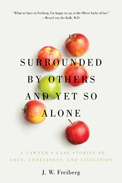
 |
Surrounded by Others and Yet So Alone: A Lawyer’s Case Stories of Love, Loneliness, and Litigation
by J. W. Freiberg
Philia Books
Consisting of five stories taken from the author’s work as a lawyer, this book offers a study in the causes of subjective chronic loneliness in those whose connections with other people “fail to provide the security, nurturing, and soothing care that others enjoy from their healthy connective networks.” In looking over his many years of case studies, the author narrows down the types of misconnections experienced by the chronically lonely into five categories: “Tenuous Connections,” in which the connections between clients are uncertain or unreliable; “One-Way Connections”—for example, unrequited love; “Fraudulent Connections,” wherein one’s relationship is based on deception and manipulation; “Obstructed Connections,” where one is prevented from being emotionally available; and “Dangerous Connections,” in which the relationship can cause devastating emotional and physical harm. For each of these misconnections, Freiberg includes a case study from one of his past clients to illustrate how people who are in relationships with others may still suffer loneliness because of the failure of their relationships to offer healthy connections.
The five case studies presented in this work are exceptional tales of the human experience. Some are heart-wrenching as they deal with innocent children who find themselves at the mercy of the adults in their lives. Others deal with the bizarre turns that life can take and the human capacity to see what one wants to see even to the point of denying an unmistakable truth. Each fascinating story is told through the voice of a master storyteller, which renders the text fluid and engaging while instilling its subjects with a humanity which elevates them far beyond a case study in a folder. One feels for each of these people as they navigate the legal system, gaining respect for the author and his role in helping them. There is much to learn about humanity, as well as the nuances of loneliness in the author’s work.
Freiberg has a unique position from which to address the issue of loneliness through the lens of litigation. He began his career as a social psychologist after obtaining his PhD at UCLA and spending a decade as a professor at Boston University. After receiving his J.D. at Harvard, he embarked on his long career as a lawyer. Having experience in both fields gives him a unique perspective on the modern phenomenon of loneliness and how it contributed to particular law cases on which he worked. This is the third of Freiberg’s books on the subject. The award-winning first, Four Seasons of Loneliness (2016), deals with four case studies from his law practice, one from each season of life. The second, Growing Up Lonely (2018), is a collection of papers, for which he served as editor, from the 2018 Symposium on Childhood Loneliness held at the Kennedy Center in Boston, MA. Each has received accolades from professionals in child psychology, with Four Seasons of Loneliness garnering the 2017 Independent Publishers Book Awards Gold Prize.
It is impossible to read these case studies without being profoundly impacted by the people involved. What Freiberg has done is to take the legal notes on each case and put a very human face on each one, all the while revealing his own deeply felt concern for his clients and their circumstances. This is a riveting read that will forever change the way one looks at chronic loneliness and the connections between humans.
Honorable Mention in the 2021 Eric Hoffer Book Award Health Category.
RECOMMENDED by the US Review
Next Focus Review
Previous Focus Review